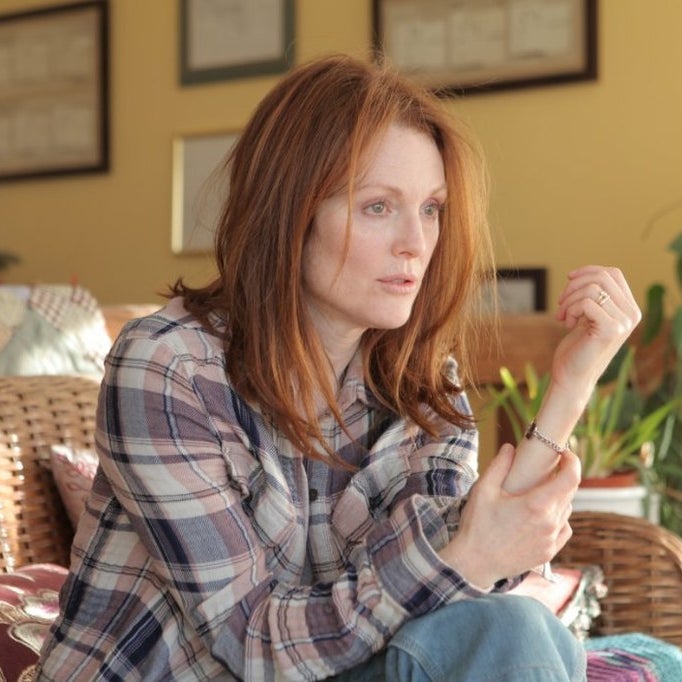
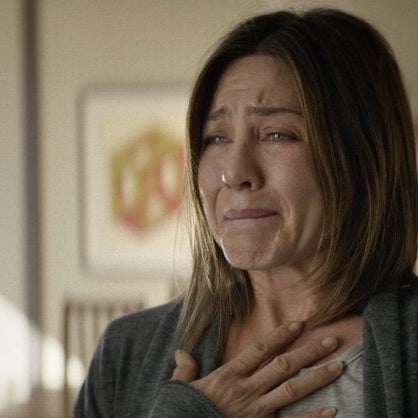
Julianne Moore has vaulted to the front of the Academy Awards race and not terribly far behind is Jennifer Aniston, courtesy of a pair of grueling roles about women whose bodies have betrayed them.
Moore's Still Alice and Aniston's Cake are showcases for challenging performances about nice, well-off white ladies whose lives are disrupted by tragedy of a realistic but no less devastating sort — with Still Alice, it's early-onset Alzheimer's, while with Cake, it's chronic pain. The privilege in which they've existed serves as a kind of plush, beige backdrop to better set off the suffering they're experiencing.
And the fact that one is good while the other is kind of awful makes them an intriguing study in contrasts about portraits of loss and the difference between empathy, manipulation, and to what end we relish in pain.
The good is Still Alice, which was written and directed by filmmaking duo (and married couple) Richard Glatzer and Wash Westmoreland (Quinceañera) and adapted from the novel by Lisa Genova. It's a portrait of a woman diagnosed with early-onset Alzheimer's that's essentially a horror movie under a bright, polished exterior. Its heroine, Columbia linguistics professor Alice Howland (Moore), is living a high-flying empty-nester existence alongside her equally esteemed doctor husband John (Alec Baldwin) when the disease emerges, slowly robbing her of memory, eloquence, and, eventually, comprehension.
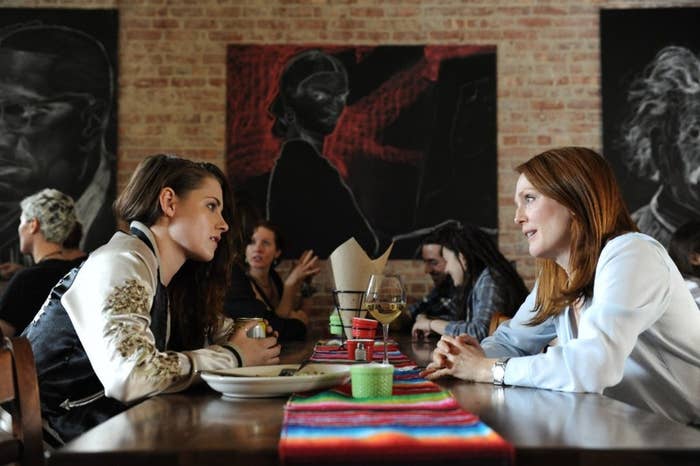
Alice is someone who specializes in words and how they're acquired, which makes her awareness of their disappearance from her arsenal all the more acute. Her first twinge of wrongness comes when, during an academic talk, she blanks on a term and can't come up with it until she's in a car afterwards, ruefully muttering "lexicon." She goes jogging and finds herself briefly, terrifyingly lost on a familiar route. She introduces herself to someone again minutes after they've met. She's afraid she may have a brain tumor, but the news she gets from her doctor is both better and much worse — Alzheimer's means no operations, no chemo, and perhaps more time, but also that her fate is sealed.
Alice's intelligence and, more pointedly, her class and background lend an extra edge to her slow disintegration, not because they make her tragedy any greater, but because they don't help in any way to slow what's happening. Her neurologist tells her she's probably been compensating for the disease's effects for a while, allowing it to go undetected. She monitors herself with memory evaluations and tells her grown children (played by Kate Bosworth, Hunter Parrish, and a very good Kristen Stewart) that they may or may not want to get a genetics test, as there's a 50/50 chance they're carriers. She's a wealthy, otherwise healthy woman accustomed to having resources at her disposal and to having things go her way, and none of that matters. Alzheimer's takes over her life as it would anyone else's, with a terrible, all-consuming inevitability.
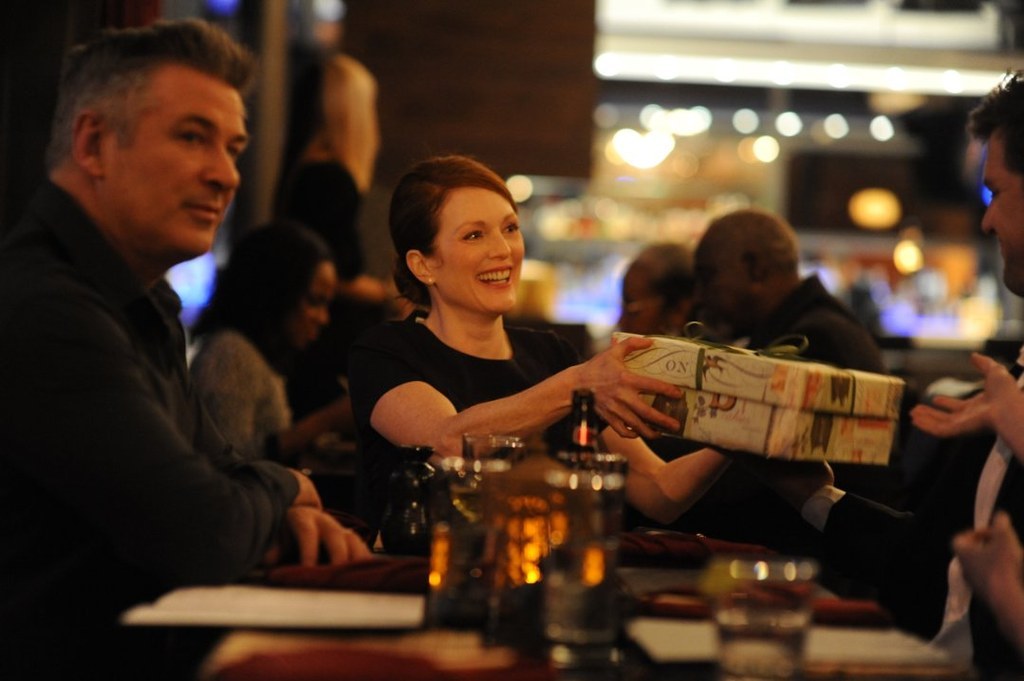
Still Alice is held aloft entirely by Moore's tremendous but delicate performance, which for the most part skips showy breakdowns in favor of concentrating on Alice living with what's happening to her, as frightening as it can be. Alice flickers from fully functional to bewildered and afraid in an instant, but it's the in-between moments, when she's made aware of exactly how much things are slipping away, that are the most wrenching. She discovers she's put her shampoo in the fridge, or gets reviews from her students claiming the class she's been teaching is muddled and unclear, or fingers the medical bracelet identifying her as mentally impaired. "I wish I had cancer," she confesses at one point. "I wouldn't feel so ashamed."
Time jumps forward in uncertain increments, and becomes, for Alice and for the audience, less and less important. The lens devastatingly holds on her throughout this journey, though at its periphery, with bittersweet frankness, we see that life pretty much goes on for her loved ones, as much as they mourn the woman she was. Still Alice is not an easy watch, as tasteful as it tries to be (sometime too much so, with its motifs involving the short but beautiful lives of butterflies), but it never turns its protagonist's experiences into a spectacle.
Cake, on the other hand, is spectacle from the start, albeit the kind that's all about tears rather than explosions. Directed by Daniel Barnz (Beastly) and written by Patrick Tobin, Cake is being touted as the role in which Aniston has proved herself a Serious Actor, as if she hasn't already done so in fare like The Good Girl and Friends With Money, which apparently weren't dour enough. In Cake she plays Claire Bennett, a lawyer whose life has ground to a halt and whose marriage has ended after an accident that's left her scarred, in constant pain, and in mourning. The trauma has also made her bitter and caustic, as displayed in the first scene, in which she dwells on the gruesome details of the recent suicide of a member of her chronic pain support group. "I hate it when suicides make it easy on the survivors," she snipes. Not long after, they kick her out.
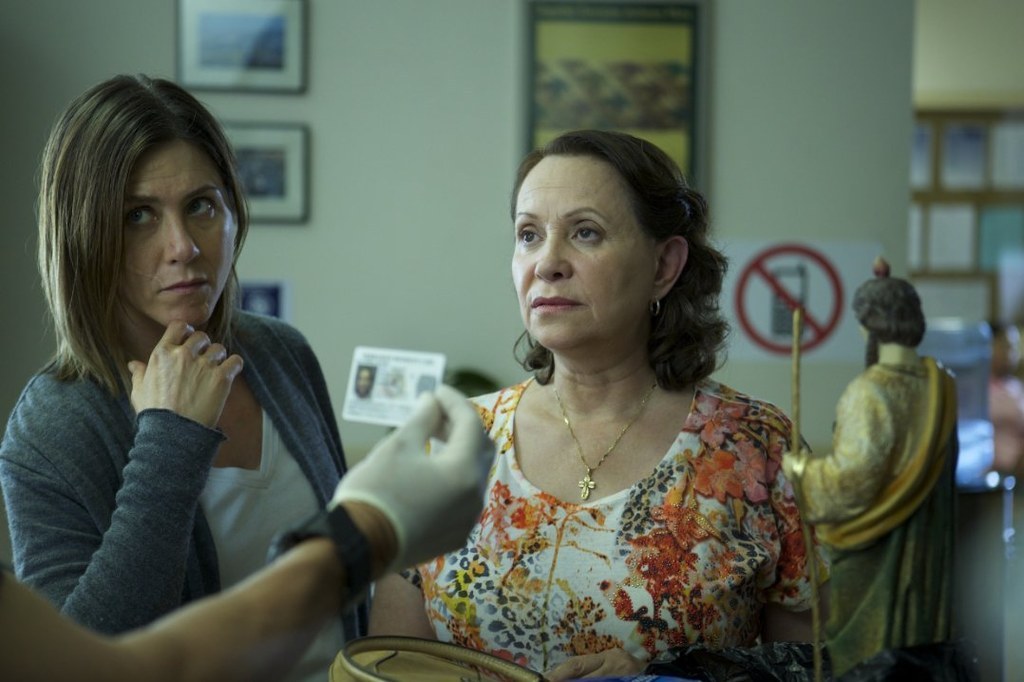
Aniston wholeheartedly dives into the role of Claire, and goes makeup-free, greasy-haired, and mean to do so. But Claire doesn't deserve the effort. She's a screenwriter's confection, a skin-deep collection of hang-ups, bad personal history to be doled out in pieces for dramatic effect, and small triumphs to be arrived at just in time. She does things like stash a bottle of pills behind a picture frame, despite the fact that she keeps the rest of her painkillers in the medicine cabinet and lives alone. Esentially, it's just an image the filmmakers like. The same goes for the tic about Claire insisting on lying down when in a car — it doesn't hurt her, it's there so that she can eventually, symbolically sit up.
Claire's addiction, her appearance, and her surliness are surface-level issues that, when she tries, turn out to be anticlimactically easy to overcome. The movie is so concerned about making the character too dislikable that it ends up turning these flaws into affectations. The pills lead to a minor misadventure at the border that Claire gets out of courtesy of friends in high places. She cleans up nicely when motivated, and even when she doesn't, she's assured by the gardener she sometimes lets into her bed that she's very beautiful. Even the nasty personality that's supposedly driven everyone in her life away, including her husband (Chris Messina), is described by other people rather than shown. "Why are you such a cunt?" someone asks. The question itself is more shocking than anything that's come out of the alleged cunt's mouth during the movie — most of the time, Claire just comes across as grumpy.
Aniston is best in the small physical bits that highlight the restlessness of what it's like to be in constant discomfort, when something as small as rolling over in bed can be agony. And the friendship she develops with the widowed husband (Sam Worthington) of the dead woman in her group (Anna Kendrick, who appears only as a sassy hallucination), while elaborately set up, has some nice beats — two people brought together, uncertainly, by grief.
But even in the better moments, Cake feels like a stunt, like someone jumping through the requisite hoops for awards approval rather than getting inside a character who doesn't really have much of an interior. And in Claire's long-suffering maid Silvana (Adriana Barraza), Cake veers dangerously close to an updated Latina version of the mammy archetype. Silvana's low paid and poorly treated, and can't help but feel maternal and protective toward her ungrateful employer anyway, staying after hours to watch over her and risking arrest to take her across the border to Tijuana to buy prescription drugs. In a movie full of sketchily thought out characters, Silvana is beyond lazily conceived. She's a narrative convenience that sums up how little empathy Cake really has for the people it's attempting to put on screen.
